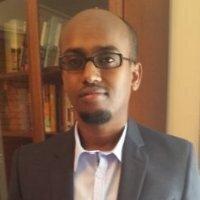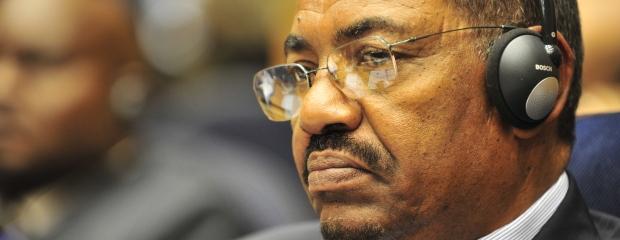Changing Prime Minister once a year will not benefit Somalia’s future – By Yusuf M. Hassan

 Somalia’s Federal Parliament was closed on Nov. 11th and 15th after a group of MPs disrupted proceedings by shouting, banging on tables, and some waving protest signs that read “No Cash for Votes” and “Somali Democracy in Action”. The MPs are deeply divided over a no-confidence motion against the Prime Minister, Dr. Abdiweli Sheikh Ahmed, who has been in office less than a year. President Hassan Sheikh Mohamud and his Cabinet allies, including 14 ministers that signed a Nov. 13th letter calling for Dr. Ahmed’s resignation, support the motion.
Somalia’s Federal Parliament was closed on Nov. 11th and 15th after a group of MPs disrupted proceedings by shouting, banging on tables, and some waving protest signs that read “No Cash for Votes” and “Somali Democracy in Action”. The MPs are deeply divided over a no-confidence motion against the Prime Minister, Dr. Abdiweli Sheikh Ahmed, who has been in office less than a year. President Hassan Sheikh Mohamud and his Cabinet allies, including 14 ministers that signed a Nov. 13th letter calling for Dr. Ahmed’s resignation, support the motion.
The Prime Minister says he is ready to accept any Minister’s resignation and defends his Oct. 25th decision, which ignited the current political feud after President Hassan rejected the Cabinet re-shuffle. The political divide continues to widen, polarize the country and weaken its fledgling institutions. It has also triggered a litany of public statements by the U.N., E.U., U.S., and U.K., warning that the political standoff undermines recent progress and plans for 2016 elections. The AP reports that the U.S. has threatened aid cuts and has already cancelled participation at the High-Level Partnership Forum for Somalia, to be held in Copenhagen, Nov. 19-20, 2014.
U.N. Special Envoy to Somalia Nicholas Kay’s strongly worded press statement citing “allegations of some MPs being asked to exchange votes for cash in the context of a potential “˜No Confidence’ motion,” sent shock-waves throughout the Somali political landscape. While some MPs heeded Mr. Kay’s remarks, other have MPs demanded his apology.
President Hassan has been defiant in his response to international criticism and pressure. In a Nov. 3rd press release, he acknowledged the international community’s support to Somalia, detailed the government’s past achievements and its goals ahead of 2016 elections, and urged the world to “respect Somalia’s sovereign right”.
This public exchange is indicative of the tense relations between the Federal Government of Somalia (FGS) and the donor community. Evidently, private dialogue has failed to achieve an understanding and diplomats resorted to public statements to exert additional pressure on Somali leaders.
The dispute between the two leaders is part of a wider conflict over power and position between President and Prime Minister. Rooted in vague constitutional provisions, the dispute is intensified by clan and political rivalries, misinterpretation of federalism, media sensationalism, and the international community’s competing policies and interests. The Somali people aspire for a re-instituted nation-state that is peaceful, united, democratic and economically viable, but the struggle between centralist and federalist thinkers further complicates the federal arrangement.
As Prime Minister Ahmed steered the formation of two new states, some believe his federalization push instigated the political impasse after colliding with centralist forces in Mogadishu. Contrary to current events, federalism was adopted in 2004 to accommodate the historic autonomy of Somali communities, advance reconciliation and social repair, encourage state formation through consensus building processes, and preserve a cohesive national identity.
The donor community’s distrust of the Somali government has its merits. The U.N. Monitoring Group’s 2014 report publicized allegations that the Somali army sells weapons on markets and engages in clan fighting, federal oil negotiations could “˜spark conflict’ if Mogadishu fails to engage state authorities in consultations, and that corruption allegations at the Central Bank damaged the donors’ trust in the FGS to deliver on public finance reforms.
Somalia suffers the legacy of conflict, institutional collapse and economic ruin; consequently, no one expects this country to recover quickly. However, the current political turmoil is a sign of a familiar saga: since 2004, Presidents and Prime Ministers have disputed, divided the country and crippled the government’s capacity to function. Confidence motions by Federal Parliament have produced seven Prime Ministers in 10 years and exposed the political system’s fundamental flaws. Some experts have even called for abolition of the position of Prime Minister, but this move might result in unintended consequences because the two positions are designed to encourage power sharing among large constituencies.
In recent months, Somali troops aided by AMISOM peacekeepers have secured territory from insurgents and eased the flow of aid in the southern regions. Beyond counterterrorism, the government is distracted by political feuds and failing to capitalize on the momentum by accelerating political progress on par with security gains. The FGS needs to implement a multi-dimensional strategy that builds working partnerships with the regions, addresses the root causes of conflict, institutionalizes constitutional governance, and enhances socio-economic vitality. A peaceful Somalia could benefit from its natural wealth – in agriculture, fisheries and energy sectors – and join the economic cooperation and integration of East Africa, compete in global markets and realize an economic transformation.
But a strategy founded on consultations and priorities is manifestly absent, and Somali leaders alone are not to blame. The international community has, at times, pursued policies that have been counter-productive or misguided. To disrupt funding sources for insurgents, for example, the U.N. Security Council adopted Resolution 2182 on Oct. 24th, authorizing any foreign government the powers of maritime interdiction in Somalia’s territorial waters to prevent banned charcoal exports. The Somali Delegation at the U.N. welcomed the move, but this wide-ranging authorization does not attempt to address the condition of instability, but rather aims to apply First Aid mechanics on its symptoms.
To its credit, the FGS has engaged the states of Puntland and Jubaland, facilitated formation of Southwest and Central states, and challenged Kenya in international court in a row over maritime boundaries. Mogadishu has also engaged in talks with the separatist region of Somaliland, but that process alienates other key stakeholders and should be more inclusive to achieve broader objectives.
The tasks ahead are critical for the country’s future and require disciplined leadership. The political process is exposed to further polarization that undermines progress and international commitments, and perpetuates the cycle of conflict and suffering; this, in turn, feeds extremism, terrorism, piracy and general instability in Africa’s longest-running conflict.
By 2016, Somalia is to complete the state formation process, engage in federal-state negotiations to produce a final Federal Constitution, conduct a constitutional referendum, and hold national elections. Bickering leaders betray the nation and these monumental tasks require leaders with vision and discipline to consolidate peace and unity, build institutions, and propel Somalia on the road to economic growth. Changing Prime Minister once a year will not benefit Somalia’s future.
Yusuf M. Hassan, a Somali-American journalist, is a political and media analyst on Somalia and Horn of Africa affairs. He formerly served as Puntland government adviser. Twitter: @yhassan_





